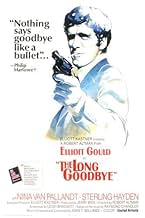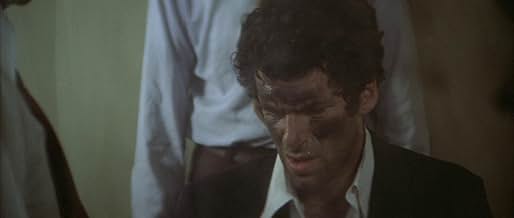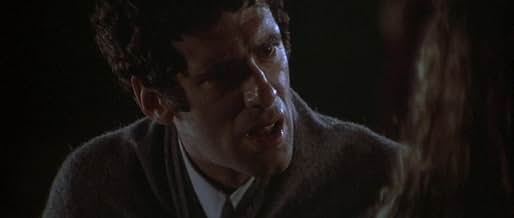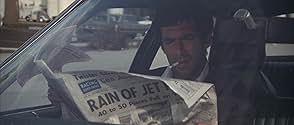Private eye Philip Marlowe helps friend Terry Lennox out of a jam and is implicated in his wife Sylvia's murder. He also is hired by Eileen Wade to locate her dipsomaniac husband Roger, who ... Read allPrivate eye Philip Marlowe helps friend Terry Lennox out of a jam and is implicated in his wife Sylvia's murder. He also is hired by Eileen Wade to locate her dipsomaniac husband Roger, who frequently disappears when he wants to dry out.Private eye Philip Marlowe helps friend Terry Lennox out of a jam and is implicated in his wife Sylvia's murder. He also is hired by Eileen Wade to locate her dipsomaniac husband Roger, who frequently disappears when he wants to dry out.
- Director
- Writers
- Stars
- Awards
- 2 wins & 1 nomination total
- Detective Farmer
- (as Steve Coit)
- Vince
- (as Vince Palmieri)
- Doctor
- (as Pancho Cordoba)
- Director
- Writers
- All cast & crew
- Production, box office & more at IMDbPro
Featured reviews
Robert Altman directs a movie based on a Raymond Chandler novel, and it's a mixed bag.
Starts off very well with some humorous scenes and dialogue and a fair amount of intrigue. The middle-to-end sections lack focus, however, and, while it is never dull, the movie feels like it is drifting to a lacklustre conclusion. The intrigue just seems to get sucked out of the movie in that segment. In addition, the theme song gets played in just about every situation and in various forms - it gets very irritating, very quickly.
Ends well though, with a good twist and a powerful conclusion.
A new take on Philip Marlowe from Elliott Gould - he is hardly Humphrey Bogart and he's not trying to be. Altman's Philip Marlowe is the dishevelled, anti-social chain-smoking anti-hero rather than the suave, confident hero that Bogart portrayed. For the most part, it works, though at times I wished for the coolness and wise-cracks of Bogie.
Supporting cast are fine. Sterling Hayden is great as the larger-than-life, Ernest Hemingway/John Huston-esque Roger Wade.
Not the Philip Marlowe of the Bogart movies, but it'll do.
Filmmaker Robert Altmans' take on the whole Neo-Noir genre does take some getting used to. It's a lot more irreverent, and goofy, than some people will expect. Devotees of Chandler and classic film noir will likely be dismayed. Scripted by the legendary Leigh Brackett, the dialogue does flow from the mouths of the cast with real ease, and it is reasonably entertaining to watch as this thing develops. After a while, however, even a viewer such as this one can see where the story is headed.
Goulds' version of Marlowe is a real change of pace. He's a quirky, hip, unflappable wise-ass who's willing to head to an all-night supermarket to obtain the only brand of cat food that his pet will eat. And he's just one memorable character in this interesting stew of a film. Hayden plays his washed-up writer for everything that it's worth. Film director Mark Rydell ("The Rose") is clearly relishing his meaty acting role as a brutal Jewish gangster. Henry Gibson ("The Blues Brothers") is an effective weasel as a doctor who expects to be PAID for his services. Danish actress Van Pallandt is alluring as the femme fatale of the piece. And there are a couple of very familiar faces in small roles: Jack Riley ('The Bob Newhart Show'), Rutanya Alda ("Mommie Dearest"), David Carradine as a chatty convict, and even Arnold Schwarzenegger as one of Rydells' goons.
Set in a sunny but rather seedy California of the 70s (complete with spacey hippie neighbours for Marlowe), this is an entertainingly convoluted tale, and a rather slowly paced one, but it always remains...interesting. It's definitely an unusual spin on the typical noir film.
Seven out of 10.
Altman's take on Chandler's other book with private eye Marlowe, The Long Good-bye, updates the action to the 1970's. He introduces a very 70's theme song and finds as different an actor as he can from Bogart for the role of Marlowe. From the opening frame, Elliot Gould plays Marlowe like a push-over. He's a man who constantly mutters to himself, suffers nervous tics, can't even fool his cat, is afraid of dog's and seems to be the only man not attracted to his sexy hippie neighbors despite their friendliness towards him and obvious promiscuousness.
However, Gould really creates a unique persona with the way he walks, talks, wise-cracks and operates. He becomes a believable person - which is why the uncharacteristic ending is so impacting. The photography, especially the night scenes, are beautifully filmed. The theme music plays everywhere - a Mexican funeral, a doorbell, a car radio etc and with different singers. There are other layers of flesh added to the telling that really work - like the compound security guards impressions of James Stewart, Barbara Stanwyck, Cary Grant and best of all Walter Brennan aka Stumpy from Rio Bravo.
This movie worked great for me and the plot, intricate though it was, was understandable. I will not compare this Marlowe to Bogart's, but do find it admirable that Altman just stuck to the goal of making a good movie without trying to ape or make obvious references to the noir genre.
Elliot Gould is Phillip Marlowe. Scruffy, sardonic and alienated private dick with a smart mouth and a cigarette eternally glued to his lips. Altman's twist? He's cool but not the suave kind that would impress dames in the 40's, the Bogart kind. He seems constantly out of place, a bit phased, doomed to observe and comment in his witty repartee on what's going on around him or just let the chips fall where they may. And they do.
Chandler's story is one of his very best. All the staples of noir are present, simultaneously fulfilling the promise of a Phillip Marlowe film and in the same time preparing the ground for Altman's take on it; murder, missing money, unhappy marriages, a private eye hired to investigate. The works. Sprawling and convoluted like the best of noirs usually are. The dialogue crackling with inventiveness, shedding tough guy lingo for a sense of playfulness, rolling in and out of the picture in a stream-of-consciousness way.
Some of the twists and characters seem to carry a sense of seething malice, a fleeting glimpse on the seamy underbelly of the Great American Beast, the scars and ugliness of Hollywood showing behind a faded facade of glamour, an escalating creepiness factor that recalls the later works of David Lynch, predating him by a good number of years as it does. The mousey Dr. Verringe and the whole clinic subplot reminded me of Lost Highway for example.
What really elevates The Long Goodbye in another level is Altman's direction and he has Vilmos Zsigmond with him. This is only my second Altman picture (after McCabe and Mrs. Miller) but 2 hours in his presence were enough to leave an indelible sense that I'm watching the work of a master on top of his craft. Altman's camera is always on the move, slowly panning and floating in and out of the frame, picking up details, guiding the eye but never getting in the middle of the story or screaming for attention. The whole thing has a natural, subdued feel to it, what with the unobtrusive lighting and bleached-out, hazy look; no glitz or glamour here. Only the faded, long-gone impression of it. This is a world we are enmeshed in that surrounds from all sides with hazy reflection.
The Long Goodbye is both a fantastic and somewhat hidden gem of 70's crime cinema and also one of the missing links in the evolution of noir, all the way from Sunset Blvd. to Mullholland Drive. You must visit at some point.
The dialogue and the acting are stilted and self-conscious. In one party sequence that takes place on the beach, Dr. Verringer (Henry Gibson) insists that he get his money. The guests stand around, as if they are movie extras brought in for this one day of shooting. The viewer can easily imagine microphones just over the heads of the principal actors, and personnel just off-screen, waiting for Altman to yell: "Cut". Along with other scenes, it looks forced and staged.
The film's best attribute is its cinematography. I especially like the sequence showing human figures retreating into the surf at night. Combined with the sound of ocean waves, it makes for an interesting segment.
Some viewers love this film because of Altman's direction and Gould's performance. Others hate it because it so deviates from Chandler's original story. I personally did not like the film, mostly because of Marlowe, himself, and because of the tangled and convoluted plot, populated by loquacious characters who I found totally not interesting.
Did you know
- TriviaThe location for Roger Wade - Sterling Hayden's home was actually Robert Altman's home at the time.
- GoofsDuring the scene where Marlowe is chasing Mrs. Wade in her top-down Mercedes 450 SL convertible, the car goes from having head rests to having no head rests in various shots.
- Quotes
Philip Marlowe: Nobody cares but me.
Terry Lennox: Well that's you, Marlowe. You'll never learn, you're a born loser.
Philip Marlowe: Yeah, I even lost my cat.
- ConnectionsEdited into El adios largos (2013)
- SoundtracksThe Long Goodbye
by John Williams and Johnny Mercer
Performed by The Dave Grusin Trio, Jack Sheldon, Clydie King, Jack Riley, Morgan Ames, Aluminum Band, The Tepoztlan Municipal Band
Details
- Release date
- Country of origin
- Languages
- Also known as
- Un largo adiós
- Filming locations
- 2178 High Tower Drive, Hollywood, Los Angeles, California, USA(Marlowe's residence)
- Production companies
- See more company credits at IMDbPro
Box office
- Budget
- $1,700,000 (estimated)
- Gross worldwide
- $27,504


































